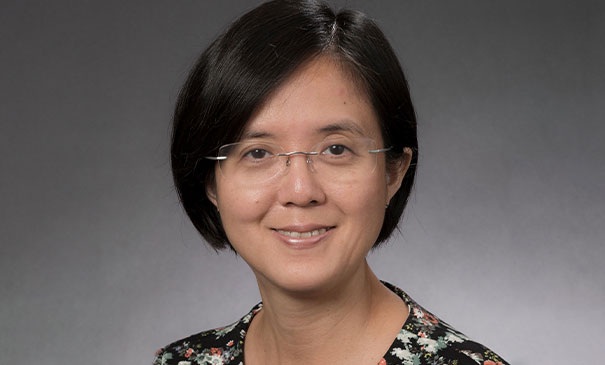
Jan Hunter will confidently declare to anyone she meets that Virginia Mason Medical Center (VMMC) neurologist, Xuan Wu, MD, PhD, is a genius.
For more than two years Jan watched her husband, Dick, struggle with progressive muscle weakness and nerve pain that limited his ability to walk and leave home. A referral to Dr. Wu changed her husband’s life by giving him the gift of living. In gratitude, the Hunters recently dedicated a gift to VMMC in Dr. Wu’s name.
“It was heartbreaking to watch Dick’s symptoms progress and limit what he could do with our kids and our grandkids,” Jan says. “Our beautiful life traveling and being with friends was slipping away as his symptoms got worse. Then, when we met Dr. Wu everything changed for the better.”
Searching for a Diagnosis
In the months after Dick’s symptoms began, doctors put Dick through a series of tests and scans that continually came up inconclusive. Because his symptoms were most closely related to ALS, doctors at the Virginia Mason ALS clinic did their best to treat his muscle weakness and dizziness while they continued to search for a diagnosis.
“Eventually we accepted that we might not ever know exactly what Dick had. There was a sense of hopelessness,” Jan says. “We were cautiously optimistic when Dr. Wu joined VMMC and wanted to take on Dick’s case.”
When the Hunters first met Dr. Wu, they were accompanied by their daughter-in-law who is a pediatrician.
“Dr. Wu’s questions were focused and specific – like she was piecing together a puzzle. When we left, our daughter-in-law was more confident than ever that she would be the doctor who could make a diagnosis,” Jan says.
Finally – Answers and a Clinical Trial
For the next few weeks, Dick came to VMMC for various scans and exams.
Finally, Dr. Wu invited the Hunters back to her clinic to share the results.
Dr. Wu told the Hunters that Dick had amyloid myopathy, a rare form of amyloidosis – caused by abnormal protein build-up in a person’s organs or tissue. Dick’s diagnosis was so rare it is only seen in 1% of amyloidosis patients.
She explained that while amyloidosis isn’t cancer, it’s closely related to some blood cancers and responds to certain chemotherapies and other treatments like bone marrow transplants. Dr. Wu also shared that researchers at Seattle Cancer Care Alliance (SCCA) were leading a clinical trial for amyloidosis patients that she believed Dick would qualify for.
“I can’t fully explain the relief we all felt,” she says. “Even more miraculous was that we have researchers and doctors in Seattle who treat amyloidosis.”
Soon after meeting with doctors at SCCA, Dick was enrolled in the trial testing a new chemotherapy for amyloidosis patients. Within weeks his symptoms started to subside.
Today, four years after he received that first treatment, Dick is stable. He still has difficulty walking, caused by muscle damage pre-treatment. But since his diagnosis and participation in the trial, his condition hasn’t gotten worse, and he continues to get care at SCCA.
“Dick is doing so much better than before,” Jan says. “We decided it was important for us to make a gift in Dr. Wu’s honor. It’s one of the most personal gifts we have ever made.”
Learn more about Virginia Mason Medical Center’s Grateful Patient Program, which honors doctors, nurses, patient navigators, social workers, and more who provide exceptional care.
 |
| Terms of Use |  |
Privacy Policy |  |
Notice of Privacy Practices |  |
Site Map |  |
Home |